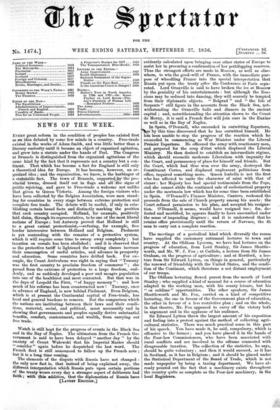NEWS OF THE WEEK.
EVERY great reform in the condition of peoples has existed first as an idea debated by some few minds in a country. Free-trade existed in the works of Adam Smith, and was little better than a literary.curiosity until it became an object of organized agitation, and grew into a statute under the hands of Peel. The Congress at Brussels is distinguished from the organized agitations of the same kind by the fact that it represents not a country but a con- tiaent. That which has become a fact for England is still only a theoretical idea for Europe. It has become, however, an or- ganized idea ; and the organization, we know, is the harbinger of a statutable fact. The town of Brussels, supptortedy the pro- vincial towns, dressed itself out in flags and all ,the signs of public rejoicing, and gave to Free-trade a welcome not unlike that given to Queen Victoria. Among the foreign visitors who have been collected by the Belgian Association, were men stand- ing for countries in every stage between extreme proteotion and complete free trade. The debate will be useful, if only in esta- blishing certain broad facts and distinctly marking the position that each country occupied. Holland, for example, positively laid claim, through its representative, to be one of the most liberal nations of Europe ; but Antwerp proved that Holland is still to a great extent protectionist,—refusing, for example, free border intercourse between Holland and Belgium. Piedmont is yet contending with the remains of a protective system, which it will require some time to sweep away completely ; but taxation on cereals has been abolished ; and it is observed that as the protective tariff is lightened the working classes increase their consumption of useful articles, and advance in prosperity and education. Some countries have drifted back. For ex- ample, the Count Arrivabene was right in saying that " Tuscany was the first country to proclaim freedom of commerce " ; she passed from the extreme of protection to a large freedom, sud- denly, and as suddenly developed a poor and meagre population into one of the healthiest and most contented. But that was in the days of Leopold the First, " of happy memory" : and how much of his reforms has been counteracted now Tuscany, once in advance of England, is now behind Piedmont. Even Belgium, which is at present the Continental capital of Free-trade, has local and general burdens to remove. But the comparison which the nations are instituting between their laws and their condi- tions, material, social, and political, must necessarily end in showing that governments and peoples equally derive substantial benefits, comfort, contentment, and wealth, from carrying out free trade.


























